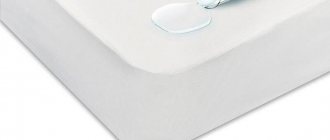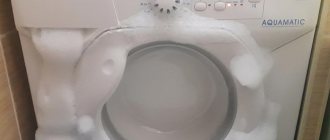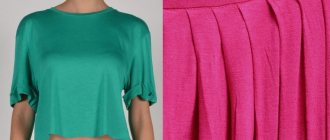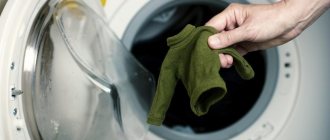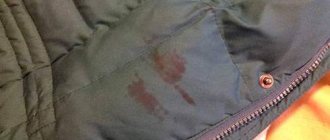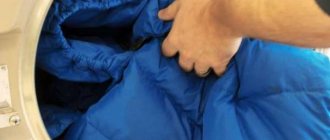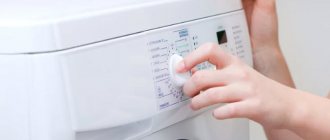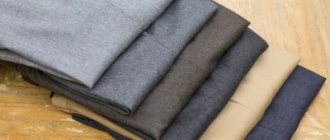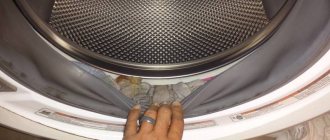The mattress cover is designed to protect the sleeping area from dirt and stains. Thanks to its use, the mattress will always remain clean and fresh.
However, the mattress pad itself needs to be washed periodically. In this case, it is necessary to take into account the type of fabric from which it is sewn. The rules for caring for the product depend on this.
For more information about whether and how to wash a mattress cover, read the article.
Is it possible to remove the cover from the mattress?
But mattresses with removable and non-removable covers have one common feature: a removable cover, like a non-removable cover, cannot be removed and washed. ... And you should definitely pay attention to the fact that when washed, the cover can change its qualities and its appearance, so if you wash the cover, then only in dry cleaning.
Interesting materials:
How many days are there in a normal leap year? How much equipment can be exported from the USA? How many teraflops are there in PS5? How many terminals are there in Sheremetyevo and which ones? How much tulle per window? How many tons of garbage are in a cube? How many tons are in 1 liter of gasoline? How much fuel can you import into Poland by car? How much fuel can be imported into Poland? How much fuel can be imported into Russia?
Basic information on hand and machine washing
The mattress cover should be washed at least once every 6 months . Vacuum it more often, with every change of bed linen. Periodically you need to hang the product out for fresh air.
These are general recommendations for washing times. Each person independently decides with what frequency it will be carried out.
The information on the product label will help you decide on the washing method. It is encoded in the form of characters. If there is no tag and it is not possible to determine the type of fabric, you need to choose a gentle treatment.
Machine washable items made from fabrics such as:
polyester;- microfiber;
- cotton and linen;
- mixed fabrics: cotton with added synthetics;
- holofiber.
Items made from delicate fabrics, such as wool, are recommended to be washed by hand. Machine processing will lead to deformation of the cover, its stretching or shrinkage, so its further use will be impossible.
This section will tell you about the rules for washing bedding.
Choose the right foundation
It is very important that each type of mattress requires its own base. For example, latex mattresses need ventilation, so they should be kept away from sources of moisture and paired with breathable bases such as wood laminates. In one of the next posts we will talk about this interesting topic and how you should combine mattresses with bases and the types of bases that exist on the market.
Remember that the mattress is very important for your rest, and therefore for your health. Check out all the IKEA mattresses on our website, come to the stores, lie down and try them out.
How to dry?
You need to dry the cover correctly, taking into account the following information:
- Products are not suspended. To maintain its original shape, it is dried on a flat surface.
- It is not recommended to place covers on heating devices.
- The better the ventilation in the room and the lower the level of air humidity, the faster the bedding will dry.
- Light-colored mattress covers can be dried in the sun. This will provide additional disinfection of the fabric.
Do not put a wet product on the mattress. It will lock under the sheets, which will lead to an unpleasant odor that will be absorbed into the bed. It's difficult to get rid of it.
How to remove stains?
During use, stains from food, biological fluids, cosmetics and more may appear on the mattress cover. Get rid of them using improvised means and household chemicals .
Each type of pollution has its own effective recipe:
- Oily spots . They are removed using dry substances, such as talc or starch. Sprinkle the powder onto the oil stain, press it with a napkin and leave for 1-3 hours. Then clean the fabric with a brush. If the stain remains, wipe it with any alcohol composition (vodka or cologne).
- Yellow stains . If yellowness appears on the mattress cover after washing, it is treated with hydrogen peroxide. If the stains are large, soaking will be required (take 4 tablespoons of peroxide for 5 liters of water). After 2 hours, the mattress cover is washed.
- Urine. If it got on the mattress cover recently and did not have time to dry, a classic wash is enough. To remove old stains, use a vinegar solution. It helps get rid of stains and unpleasant odors. Take 1 tbsp per liter of water. l. vinegar 9%. The product is soaked for 60 minutes, after which it is washed as usual.
Tea and coffee stains .
They can be easily removed with dishwashing detergent. It is applied to the dirt, rubbed lightly with a soft brush and left for 40 minutes. To enhance the effect, you can add 1-2 tablespoons of soda, which is also rubbed into the stain. Then all that remains is to wash the bedding.- Blood. If the stain is fresh, treat it with laundry soap, rub with a brush and rinse the fabric under running cool water.
Dried blood is moistened with a concentrated solution of soda and salt (take 2 tablespoons of each substance per 250 ml of water). After half an hour, the area is washed with soap. - Cosmetics. Stains from mascara, lipstick and foundation can be easily removed with alcohol. Apply it to a cotton pad and wipe the contaminated area of fabric. When the stain has completely disappeared, you need to wipe the mattress cover with a damp, clean cloth and let it dry.
- Wine. You can remove the stain with ammonia. It is applied to a napkin, which is used to wipe the spilled wine. If the stain is old, a napkin soaked in ammonia is left on it as a compress for half an hour and rubbed with a brush. All that remains is to wash the mattress cover in a machine or by hand.
You need to start removing stains immediately. If they get absorbed into the fibers of the fabric and into the filling of the mattress pad, it will be difficult to get rid of them.
Rules for processing different types of fabric
There are some features of washing mattress covers made from different types of fabric . Failure to comply with them may cause damage to the product.
Some covers can be washed in cool water, others - with gentle detergents. There are some mattress covers that can only be cleaned dry.
Cotton
Cotton mattress covers are machine washable. They do not require turning off the spin function. You can use regular washing powder as a detergent .
Cotton is not afraid of boiling, but you need to resort to this method as needed. When exposed to high temperatures, the fabric may shrink. Therefore, for classic washing, the water temperature should not exceed 60 degrees.
The white cotton mattress cover can be dried in the sun. Under the influence of ultraviolet radiation, additional disinfection of fabrics occurs.
Microfiber
Microfiber is a synthetic fabric that is easy to clean. This mattress cover can be machine washed.
Basic rules to follow:
- Do not wash in water above 60 degrees.
- Do not use aggressive substances containing chlorine and acid for washing.
- Do not press at high speeds.
- Do not dry on the radiator.
By following these simple recommendations, you will be able to significantly extend the life of the product.
Bamboo
A bamboo mattress cover can be of three types:
- protective single-layer bamboo fiber cover;
- orthopedic mattress pad;
- mattress cover with bamboo filling.
Thin single-layer and orthopedic covers are machine washable at temperatures up to 40 degrees and without spinning. Thick mattress covers filled with bamboo fiber can be dry cleaned with a vacuum cleaner. If stains appear on it, they are removed manually.
Feather and down
Feather mattress covers are washed according to the following rules:
The water temperature should not exceed 40 degrees.- The maximum spin speed is 400 rpm.
- Be sure to turn on the extra rinse mode.
- Liquid powders or gel capsules are used as detergents.
- It is not recommended to use bleaching compounds and products containing aggressive components.
- The mattress cover should be hung to dry.
It is necessary to take into account that after getting wet, the weight of a feather mattress cover will increase by 3-4 times. Therefore, it is loaded into the drum of the washing machine in a single copy to prevent overload.
After drying, the feather cover is shaken so that the filler is evenly distributed throughout the cover.
Wool
Wool mattress covers are used for the cold season, as they perfectly retain heat in bed.
Such products are washed according to the following rules:
- Select the “wool” program on the washing machine display. It contains the necessary parameters by default.
- If there is no special mode for washing woolen products, the setting is carried out manually. The water temperature should not exceed 30 degrees, the spin cycle is turned off.
- Use only liquid detergents that contain lanolin.
- To make the mattress cover dry faster, after washing it is wrapped in a terry towel and gently pressed down. The fabric will absorb excess water.
- You should not iron or hang wool mattress covers in the sun.
Woolen items may stretch during washing. Therefore, it is recommended to dry them in a horizontal position.
Coconut
You cannot wash a coconut mattress pad. This fiber does not tolerate contact with water and loses its orthopedic function.
Basic rules for caring for the product:
- Regular ventilation. It is taken out into fresh air and left for several hours.
- Removing dust using a vacuum cleaner.
- Professional dry cleaning. It must be carried out at least once every 3 years.
If stains appear, they are removed using a sponge and a non-aggressive cleaning agent, such as liquid baby soap. Humidification should be minimal.
Holofiber
Holofiber is an artificial filler that is often used to make mattress covers. They can be washed both by hand and in a machine.
Basic Rules:
- maximum washing temperature – 90 degrees;
- spinning can be carried out at high speed;
- For washing, both powder and liquid detergents are used;
- If there is heavy dirt, the cover can be soaked.
When preparing for washing, you need to take into account not only the type of filling, but also the fabric from which the mattress cover is made. If the material is delicate, for example silk, then gentle manual or machine processing is necessary.
Jacquard-satin
Jacquard satin is a finicky fabric that requires careful handling. Rules to follow:
- Machine washable, but only in a gentle cycle;
- the water temperature should not exceed 30 degrees;
- spin is turned off;
- For washing, use liquid detergents, do not use bleaches.
When the mattress pad is dry, you can iron it at the lowest temperature. The product must be turned inside out.
Antibacterial
There are mattress covers impregnated with special antibacterial compounds. Such products must be washed according to the information indicated on the label. The rules for caring for them depend on what product was used as impregnation.
Most often, covers are washed in a machine at a temperature of 30-40 degrees, since antimicrobial compounds are not afraid of contact with water and intense spinning. Most impregnations can withstand up to 100 washing cycles.
It is not recommended to use powders or aggressive compounds as detergents. They contribute to the rapid destruction of antibacterial components. Preference should be given to liquid concentrates.
Ways to remove heavy stains at home
Some types of stains are not so easy to remove. Special compositions come to the rescue, which are easy to make yourself from simple and affordable components.
Urine
A fresh urine stain is washed with cold water. Old stains require thorough cleaning using special solutions:
- Regular liquid soap without dyes helps. A small amount of soap is applied to the problem area. After a few minutes, remove any remaining product with a damp cloth.
- Salt is dissolved in lemon juice. The finished mass is distributed over the stain and left for 36 minutes. Then wipe the area with a damp sponge and wash the product in the washing machine using washing powder.
- Vinegar works well for removing urine stains. A small amount of liquid is applied to the stain and after a couple of minutes the mattress cover is washed in cool water with laundry soap or baby powder.
Coffee and tea
Table vinegar removes drinks well. Dissolve a few drops of vinegar in water. Soak a cotton swab with the prepared solution and apply it to the damaged area. After 16 minutes, the product should be washed as usual.
Blood
It is better to wash blood stains immediately after they appear. The damaged area is washed in cold water and laundry soap. If the blood has already penetrated into the deep fibers and has frozen, then the following recipes will help:
- Cold water is poured into the container. Dissolve 30 g of laundry soap shavings in it. The mixture is applied to the dirty area and lightly rubbed in with a soft brush. The mattress cover is left for 26 minutes, after which it is washed as usual using washing powder.
- 86 g of salt or baking soda are dissolved in 240 ml of warm water. The resulting mixture is applied to the stain and left for 23 minutes. Then the composition is washed off with water and the product is washed in a washing machine.
- A cotton swab soaked in hydrogen peroxide is applied to the problem area for 16 minutes. After this, it is enough to wash the area with laundry soap and rinse off the solution with clean water.
Cosmetics
Contamination left over from cosmetics can be easily removed with alcohol or acetone:
- a cotton swab is moistened in an alcohol solution;
- applied to the problem area;
- the cotton wool is changed until it remains clean;
- At the last stage, all that remains is to wash the bed linen in the usual way.
Fat
It’s quite easy to get rid of grease stains using products that are sure to be found in every home:
- Fatty stains can be easily washed off with starch, salt or talcum powder. A small amount of the selected product is poured onto the problem area. After 26 minutes, it is enough to wipe the area with a damp cloth.
- Alcohol or acetone helps to cope with contamination. A cotton swab is soaked in an alcohol solution and applied to the site. After 32 minutes, you need to rinse the area with clean water.
- Liquid dish detergent works great on greasy marks. A few drops are applied directly to the area and washed off with water after 22 minutes.
Wax
To get rid of wax stains, you will need to follow a number of simple steps:
- First you should scrape off the wax with the blunt side of the knife;
- then the area is ironed through a paper napkin;
- The product is washed in the usual way.
Sticky spots
Cold helps get rid of sticky dirt. Place ice in a plastic bag and apply to the problem area for 7 minutes. Once the dirt freezes, it can be easily scraped off with the blunt side of a knife.
How to dress afterwards?
After washing, the mattress cover must be placed correctly on the mattress.
Basic recommendations:
- If there is oilcloth, it should be adjacent to the mattress. There is always fabric at the top.
- To understand where the width of the product is and where the length is, you need to lay it out on the bed.
- If there are elastic bands sewn into the corners, they are tightened one by one.
A correctly installed mattress cover should lie flat on the bed, without folds or lumps.
Caring for mattress covers from different manufacturers
Depending on the manufacturer of the mattress cover, there are certain features of caring for it. Basic recommendations:
Ascona. The top layer of the product is made of cotton fabric, so washing at high temperatures may cause shrinkage.
The manufacturer recommends cleaning it in water up to 40 degrees. Machine washable, but on gentle cycle.Hard mattress covers are processed only manually or dry. Read about washing Askona mattress covers here.
- Ormatek. These high quality products require careful care.
If the cover is thin, then it can be washed in a machine, turning off the spin cycle. The water temperature should not exceed 30 degrees. For hard orthopedic mattress covers, only dry cleaning is suitable. - Ikea. Most often, such mattress covers are made of polyester and cotton. Therefore, they can be machine washed at 60 degrees and at low speeds. It is not recommended to use stain removers, bleaches and conditioners. Products are not allowed to be ironed.
The range of mattress cover manufacturers offers is quite wide. Therefore, there are no universal instructions for caring for them. Before washing, you need to study the information indicated on the product label.
Features of washing Askona mattress covers
A distinctive feature of Askona mattress covers is that in the manufacture of the outer layer, knitted cotton fabric is used, which requires special washing conditions, since otherwise it can stretch.
You should set the temperature no higher than 40 degrees, set the gentle mode, use only mild detergents, without twisting by hand and without spinning in the machine.
Such mattress covers should be dried on a flat surface, laid out on oilcloth; hanging them on a clothesline is contraindicated.
The waterproof mattress cover produced by this company differs from conventional membrane products in its temperature resistance and wear resistance.
It is designed for 200 washes and can withstand temperatures up to 50 degrees, as well as medium-heat machine drying.
Cotton
The mattress cover is made of 100% cotton, there are no synthetics, the fabric is only natural.
Such covers are bought for children and adults. Cotton mattress covers are easy to care for. How to wash waterproof mattress covers depends on whether there is a polyurethane membrane underneath or not.
Regular cases and waterproof cases are cleaned differently
Be sure to pay attention to this. For example, if cotton is both at the bottom and at the top - the temperature is 65 ° C, and if only at the top (there is moisture-repellent fabric at the bottom) - the temperature should be no more than 40 degrees
Proper care:
- Can be washed by hand or in a washing machine.
- Hot water will cause the fabric to shrink. Carefully set the temperature and make sure that during the entire procedure the knob is turned to 40 degrees, especially if there is a child in the house who likes to play around with the washing machine.
- The cotton may clump into small clumps. The problem is solvable. After washing, carefully straighten the filling.
- Ironing is not prohibited. On the contrary, this is welcome, since it also kills harmful microorganisms. Set the iron to the lowest setting and iron through slightly damp gauze.
- Detergents are selected according to the outer fabric. Cotton can be washed with delicates or baby powder.
Cotton mattress covers have a long service life. The shelf life of this product is measured by washes, the number of which is 100. This cover will last up to 3 years, then it will need to be replaced.
Important Tips
Tips to help make washing safe and effective:
- Before loading things into the drum, you need to sort them by color so that the mattress cover does not fade.
- Before using a new stain remover or any available product, you need to test it on an inconspicuous area of the fabric.
- The less often the product is machine washed, the longer it will last, so you should only use it when necessary.
- To prevent the mattress cover from getting dirty, it is not recommended to sleep on it. It must be covered with a sheet.
Before making a purchase, you need to ask the seller about the rules for caring for the mattress cover. There are products that cannot be washed. They should be purchased only after a thorough assessment of all the conditions of upcoming use.
Removing stains
Before you put the mattress cover in the wash, you need to remove the stains. Depending on the nature of the stain, the necessary remedy is selected.
Urine
Fresh stains can be easily washed off under cool running water.
You will have to work on old, stubborn stains using special products:
- Freshly squeezed juice of one lemon is mixed with a spoon of salt. The resulting solution is carefully applied to the stain and the product is left alone for several hours. Afterwards, wipe the dirt with a damp sponge and put the mattress cover in the wash.
- The stain is treated with liquid soap. After thirty minutes, the stain is washed off in warm water.
- Apply two tablespoons of table vinegar to the stain. After ten minutes, the product is washed in warm water with the addition of washing powder.
Coffee and tea
Yellowish-brown stains from coffee or tea can be removed very quickly by vinegar. It is enough to moisten a cotton sponge with vinegar, apply it to the stain and leave for fifteen to twenty minutes. The product is then washed as usual.
Blood
The main rule to remember is that blood stains from the mattress cover must be removed immediately after they appear.
It's very simple: the blood stain is generously moistened with hydrogen peroxide. After the reaction has occurred, the contamination is carefully removed with a cotton sponge or soft sponge. If necessary, the process is repeated several times.
Fat
Traces of grease from a mattress cover can be removed in the following way:
- Sprinkle starch, salt or talc (optional) onto the stain. The absorbent powder will very quickly absorb the grease particles and not a trace will remain of the stain.
- Treat the stain with a soft sponge soaked in liquid dishwashing detergent. If the stain does not come off the first time, repeat the procedure.
Traces of cosmetics
Alcohol or acetone will help quickly remove makeup stains on a mattress cover.
What to do:
- soak a cotton swab in alcohol and apply it to the stain;
- after five minutes, if the stain has not disappeared, change the cotton wool for a new one.
From wax
Candle marks can be removed by following a number of simple steps:
- scrape off wax particles from the mattress cover with the blunt side of a knife or scissors;
- cover the remaining greasy wax stain with a paper napkin and iron it with a hot iron;
- We wash the mattress covers in the usual way.
How to wash a waterproof?
Waterproof mattress covers are made from membrane fabric. Thanks to its special structure, it repels liquid.
Before you start washing such a product, you need to make sure that the manufacturer does not prohibit it . If there is a corresponding symbol on the label, you must contact the dry cleaner.
Machine wash should be gentle, without spinning and at low temperatures (up to 40 degrees). Do not wring out the fabric. The product is hung over the bathtub so that the water drains from it on its own.
The less often such a cover is washed, the better. Read more about washing waterproof mattress covers in this article.
